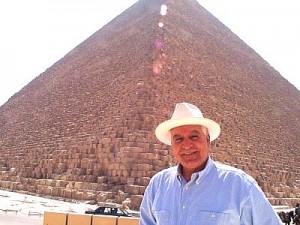Even as I celebrated the democratic aspirations of the Egyptian protesters earlier this year, I felt compelled to make this ironic and cautionary observation:
I fear these wannabe revolutionaries have become so intoxicated with their own ‘people power’ that they seem every bit as dictatorial now as they’ve accused Mubarak of being.
(Mubarak concedes…, The iPINIONS Journal, February 2, 2011)
After all, pursuant to their demands, the military forced Mubarak to resign; pursuant to their demands, the military froze his assets and vowed to prosecute him and his family for decades of corruption; and pursuant to their demands, the military not only promised to cede power to a democratically elected government, it appointed an interim council of elders to manage the transition and address the protesters’ pesky concerns about:
…who should rule, how they should rule and who should decide the way they rule….
(New York Times, July 12, 2011)
 So, given the three decades of oppression their country suffered under Mubarak’s dictatorship, you’d think these newly-baptized revolutionaries could cool their heels for just one more year while the council facilitates the drafting of a new constitution and the implementation of new policies and procedures to guarantee democratic elections.
So, given the three decades of oppression their country suffered under Mubarak’s dictatorship, you’d think these newly-baptized revolutionaries could cool their heels for just one more year while the council facilitates the drafting of a new constitution and the implementation of new policies and procedures to guarantee democratic elections.
But most of them are kids whose frame of reference is informed not by history or personal experience, but by social networking. As such they seem to think that transitioning from dictatorship to democracy should be as quick and easy as downloading a good-governance app to their PDAs.
We have a feeling the regime is still there, somehow. They sacrificed the icons of the regime, but the cornerstone is still there… Sit-in! Sit-in! A sit-in until the regime is put on trial.
This, according to the New York Times (July 12, 2011), is what compelled Tarek Geddawy, 25, to return to Tahrir Square on Friday, where he joined hundreds of thousands vowing to stay until what they’re calling Egypt’s ‘second revolution’ (in six months) is over. The regime they’re referring to of course is the military. Never mind that the military is the only institution that is keeping the country together these days.
 Beyond this, to execute their demands to dismantle “the cornerstone”, the military would have to purge all of Egypt’s civic institutions of anyone who had any ties to the Mubarak regime. But these nincompoops fail to appreciate that, after a 30-year dictatorship, by definition, anyone with any ability to do anything to help their country through this transitional had ties to the regime.
Beyond this, to execute their demands to dismantle “the cornerstone”, the military would have to purge all of Egypt’s civic institutions of anyone who had any ties to the Mubarak regime. But these nincompoops fail to appreciate that, after a 30-year dictatorship, by definition, anyone with any ability to do anything to help their country through this transitional had ties to the regime.
Apropos of this, Zahi Hawass, Egypt’s famous antiquities minister who for decades has been almost as big a draw for tourists as the pyramids themselves, exclaimed in utter stupefaction this week that the protesters are fomenting a “witch hunt” even against him.
Again, as I observed in my opening quote, these protesters have become so intoxicated with their power to get the military to do their bidding that they are too drunk (and naive) to grasp the folly inherent in their demands. But I warned it would be thus:
With all due respect to the protesters, the issue is not whether Mubarak will go, for he will. (The man is 82 and already looks half dead for Christ’s sake!) Rather, the issue is who will replace him. And it appears they have not given any thought whatsoever to this very critical question.
The devil the Egyptians know might prove far preferable to the devil they don’t. Just ask the Iranians who got rid of the Mubarak-like Shah in 1979 only to end up with the Ayatollah – whose Islamic revolution they’ve regretted (and have longed to overturn) ever since….
(Army pledges no force against protesters, The iPINIONS Journal, February 1, 2011)
 Frankly, it seems the only thing that will satisfy these protesters – who clearly have no ability to lead Egypt’s transition and have no faith in the ability of anyone else to do so – is replicating throughout the entire country the festive state of anarchy that reigns among them in Tahrir Square.
Frankly, it seems the only thing that will satisfy these protesters – who clearly have no ability to lead Egypt’s transition and have no faith in the ability of anyone else to do so – is replicating throughout the entire country the festive state of anarchy that reigns among them in Tahrir Square.
And, if that were not discouraging (or troubling) enough, their protests are even taking on the spectre of anti-Americanism that fueled the Iranian revolution – just as I presaged with my reference to the Iranian revolution above. And we all know how that turned out.
The United States is viewed less favorably in much of the Arab world today than it was during the final year of the Bush administration, and President Obama is less popular in the region than Iranian president Mahmoud Ahmadinejad.
(The Boston Globe, July 13, 2011)
God help them, and Egypt.
Related commentaries:
Mubarak concedes…
Army pledges no force…